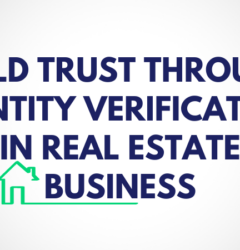Identity Verification
Proof of address document as a part of identity verification process
- No Comments
29 Apr

When creating an account to verify your identity you are usually required to submit an identity document. Based on that, and additional information provided, your identity is verified. However, sometimes additional documentation is needed, and that is the proof of address. It is usually required when opening a bank account or another money transfer related account. Proof of address confirms that the address stated for the verification purposes is actually a residence address and ties the user to a specific location.
Why do some companies require a proof of address?
To minimize the risk of a fraud during the onboarding process and to comply with the Know Your Customer and Anti Money Laundering rules, businesses perform additional checks like address confirmation. It further ensures that the user is actually the one who he says he is. Additionally it helps to spot the users that are from a high-risk country, who normally would not be eligible to create an account. Many financial institutions and brokerages exclude users from those countries and a proof of address is an ideal way to verify the location of the user. The banking industry and financial institutions often use proof of address as another security measure. The same process can be implemented for the newest branch of banking that is digital banking. Digital banks or neobanks do not have a physical branch and are available 24/7 online. This means that conducting Video KYC in digital banking and knowing the location of their customers is even more important. Companies may also impose restrictions on the users within the specified geographic area. This could be caused by compliance with the specific geographical law or just by companies policies. Furthermore proof of address ensures that the address is up to date, which is another requirement of the KYC policy.

When is it necessary?
In order to help minimize the risk of fraud, businesses implement a more secure way of identity verification using proof of address. In the US, the Federal Trade Commission received more than 2.1 million fraud reports from consumers in 2020. They reported losing more than $3.3 billion to fraud in 2020. Online shopping was the second-most common fraud category reported by consumers. Not only ecommerce uses proof of address check as a part of the identity verification process. Other branches like online gaming and gambling sites, lenders, insurance companies, banks, brokerages and crypto wallet providers also use enhanced due diligence regarding their customers.
What documents are supported?
Most likely you already have the required document. Emails with bank statements or notifications about a new invoice from an internet provider that are ready to download are a great start. What is important is to keep your address up to date and notify everyone about the changes. Each company has its own standards when it comes to accepting different documents as a proof of address. The most common accepted documents are:
- Bank statements
- Credit card statements
- Utility bills
- Residence permit
- Insurance statement
- Tax document
- Payroll statement or an official salary document from the employer
- Residence certificate
Alternatively an identity document can be used as a proof of address as long as it has the address written on it and is not the same as the document used as an identification document.

What is verified on PoA?
Depending on the company’s requirements the proof of address should usually be not older than 3 or 4 months, so it should have a visible date of issue. Additionally it should be addressed to the person who is verifying themself. The name of the issuing authority needs to be visible. The full document needs to be shown during the verification. Additionally the address needs to match exactly the address provided as the residence address. Documents in foreign languages are accepted. Depending on the company policies documents written in a foreign alphabet could also be accepted, the same applies to the official translations of the documents.
Documents addressed to a PO box are not acceptable. Only documents linked to the residential property are accepted. Hand written documents, receipts and invoices for purchasing goods will be rejected. Correspondence is not considered to be a valid proof of residence – even the one from the bank or government. Depending on the company policies you may be allowed to redact confidential information like transaction details from the bank statement. More specific information about what is accepted and what is not is always provided by the company. It is always a good idea to double check the requirements before going through the onboarding process. This will prevent you from having to delay your application and start the verification from the beginning.
There are many different options of identity verification. What is the best one that provides a confident result and is able to comply with local and government regulations worldwide? Considering the number of possible documents that could be used as a proof of address, verifying identity using automated solutions may result in many false positives results or a high rejection rate. That would lead to a high number of application drop-offs. Choosing an identity verification provider, like Fully-Verified, that can combine what is best in technology with a human touch, can create a better onboarding experience for the customers, increase the identity verification assurance and eliminate any attempts of fraud.
Related Post
Search
Recent Post
 Protecting Players and O…June 15, 2023
Protecting Players and O…June 15, 2023 From Anonymous to Accoun…May 25, 2023
From Anonymous to Accoun…May 25, 2023 The Future of Identity V…May 10, 2023
The Future of Identity V…May 10, 2023 Is It Time to Invest in …April 26, 2023
Is It Time to Invest in …April 26, 2023 KYC in financial and ban…March 24, 2023
KYC in financial and ban…March 24, 2023
Categories
Archives
- June 2023
- May 2023
- April 2023
- March 2023
- January 2023
- December 2022
- October 2022
- August 2022
- July 2022
- June 2022
- April 2022
- March 2022
- February 2022
- January 2022
- December 2021
- November 2021
- October 2021
- September 2021
- August 2021
- July 2021
- June 2021
- May 2021
- April 2021
- March 2021
- February 2021
- January 2021
- November 2020
- July 2020
- March 2020
- November 2018
Fully-Verified was created as answer to its founders collectively losing over $150 000 to various types of fraud in their eCommerce businesses.









